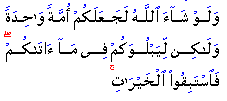Necessary Diversity, Price Control, Ringtunes & Prayer
Issue 453 » November 23, 2007 - Dhul-Qida 13, 1428
General
| Living the Quran |
Al-Maidah
(The Table Spread)
Individuals, innocent and free, have to make their choices (either to accept or to reject the Revelation); there will necessarily be diversity among people by the will of the Transcendent. The Revelation teaches that the purpose of these differences is to test us in order to discover what we are going to do with what has been revealed to us: the commandment in this verse is to use these differences to "compete in doing good." Diversity of religions, nations, and peoples is a test because it requires that we learn to manage difference. Differences might naturally lead to conflict: therefore, the responsibility of humankind is to make use of difference by establishing a relationship based on excelling one another in doing good. Knowing the other is a process that is unavoidable if fear of difference is to be overcome and mutual respect is to be attained. So human beings live a test that is necessary for their nature but that they can - and must - master by making the effort to know and recognize those who are not of their tribe, their country, their race, or their religion. Source: |
| Understanding the Prophet's Life |
Price Control In Islam the market is to be free and permitted to respond to the natural laws of supply and demand. Thus, when the prices became high in the Prophet's time and people asked him to fix prices for them, he replied, Allah is the One Who fixes prices, Who withholds, Who gives lavishly, and Who provides, and I hope that when I meet Him none of you will have a claim against me for any injustice with regard to blood or property. (Reported by Ahmad, Abu Daoud, al-Tirmidhi, Ibn Majah, al-Dari and Abu Y'ala.) With these words the Prophet of Islam (peace be on him) declared that unnecessary interference in the freedom of individuals is injustice and that one should meet Allah free of blame for such a thing. If, however, any artificial forces, such as hoarding and manipulation of prices by certain merchants, interfere in the free market, public interest takes precedence over the freedom of such individuals. In such a situation price control becomes permissible in order to meet the needs of the society and to protect it from greedy opportunists by thwarting their schemes, for the above hadith does not mean that price control is prohibited regardless of the circumstances, even if it removes harm and prevents obvious injustice. Researchers among scholars have concluded that, depending on the nature of the circumstances, price control may at times be unjust and prohibited, and at other times may be just and permissible. If price control compels people to sell their goods at a price which is not acceptable to them or denies them the reasonable profit permitted by Allah, it is haram. If, on the other hand, price control establishes equity among people, for example, by forcing sellers to accept a price equal to that commanded by other comparable commodities and restraining them from taking more than this, it is allowed—indeed necessary. The hadith cited above relates to the first type of situation. Accordingly, if merchants are selling a commodity in the customary fashion without any wrong-doing on their part and the price subsequently rises due to the scarcity of the commodity or due to an increase in population (indicating the operation of the law of supply and demand), this circumstance is from Allah, in which case to force them to sell the commodity at a fixed price would be unjust compulsion. In relation to the second type of situation, should the dealers in a commodity refuse to sell it, despite the fact that people are in need of it, unless they secure a price higher than its known value, they must be compelled to sell it at a price equal to the price of an equivalent commodity. Price control here means nothing more than establishing comparable prices for equivalent commodities and it is therefore in conformity with the standard of justice demanded by Allah Ta'ala. (Refer to Risalat al-hisbah by Ibn Taimiyyah, as well as to Al-turuq al-hikmiyyah by Ibn al-Qayyim, p. 214 ff.) Source: |
| Blidspot! |
Ringtunes & Prayer Prayer is the most important act that we can ever hope to perform in this world: It is the celebration of remembrance of Allah, our Creator and Sustainer; our sure connection with Him; and our key to salvation and eternal bliss. It is therefore imperative that we enter Prayer in a state of utter concentration and presence of mind. In order to attain this goal, it is only proper of us to do everything possible within our means to dispel all distracting thoughts and keep away all those things that may decrease or affect our concentration. Thus, we ought to switch off our cell phones and other devices, if at all we are taking them with us to Prayer. It is even better that we do not take them along with us to Prayer. If we are not supposed to distract one another even by reciting the Qur'an, we need not mention other types of distractions. This said, if we happened to carry our cell phones to the Prayer hall and it rang, we must switch it off immediately. By failing to do so, we are not only distracting ourselves but also everyone else in the congregation. This single act alone would not render our Prayer invalid, but the issue is different if we keep on doing it often: According to scholarly consensus, repeating such acts often would definitely render the Prayer as invalid. Source: |
